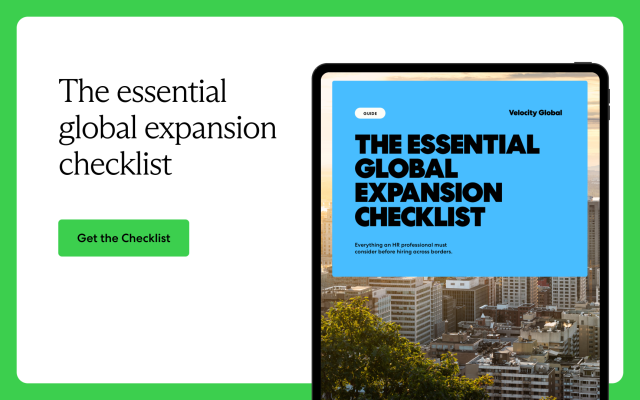As businesses map their growth trajectory in today’s interconnected world, many see global expansion as an inevitable and advantageous step. By expanding internationally, businesses can leverage economies of scale, reduce production costs, mitigate risk, and enhance brand awareness.
Still, there’s no one-size-fits-all approach—global expansion is an investment strategy that requires careful planning according to your company’s individual goals. From market assessments to global talent management, organizations must consider several factors to ensure success.
Read on to discover the top five global expansion strategies for ensuring success as you enter foreign markets.
Growing your business abroad? Get our global expansion checklist to learn key tips and insights on how to develop your global expansion strategy, conduct market research, and engage top global talent with compliance.

1. Keep a light footprint
One of the most important strategies for expanding internationally is to keep a light footprint and remain agile.
The traditional approach to expanding overseas involves establishing a legal business entity in your target market, which makes sense if you anticipate a long-term presence there. However, entity establishment is time-consuming and costly, involving large upfront expenditures, ongoing maintenance costs, and investments in local infrastructure.
Consider holding off on infrastructure investments or hard costs until your foreign operation has matured. Remaining agile as you expand is key to success, from choosing a market to analyzing market feedback after entry.
Agile approaches to global expansion
Two ways to remain agile as you expand overseas are hiring international contractors or partnering with a global expansion expert, such as an employer of record (EOR).
Both approaches offer unlimited flexibility as you expand, though keep in mind that hiring contractors involves a serious misclassification risk. Worker designation laws vary drastically worldwide, posing a unique risk to foreign employers.
The safest and most flexible approach to global expansion is to partner with a global expert, such as an EOR. An EOR offers comprehensive, multi-level support, from market analysis to running global payroll. We discuss the benefits of partnering with an EOR in greater detail later on.
Regardless of which approach you choose, remember that human capital is priceless. A committed, local team can evaluate market penetration plans daily, identify untapped opportunities, and offer on-the-ground insight on potential adjustments whenever necessary.
The key to hiring is to do so with a light and agile footprint while balancing it against risk mitigation.
2. Adopt a clear product strategy
Market research is the foundation of a successful global expansion strategy. By thoroughly assessing the global marketplace and conducting meticulous data analysis, you can identify attractive target markets.
A key aspect of market research should focus on how well the local consumer base will receive your product. Through detailed market analysis, you can reveal unique opportunities and challenges your product will face.
Discern the needs and wants of the local consumer base and identify similarities and differences between your product and your competitors. Such insights allow you to recognize market needs and tailor your product to meet the unique demands of various customer personas across different markets.
Once you develop a clear product strategy, you can redefine your product or position in the new market as you expand operations.
3. Revenue gain, reinvest, repeat
Continuously fuel your overseas operations with the resources they need to thrive. Consider revenue gains as reinvestment opportunities.
One effective strategy for increasing reinvestment capabilities is to choose an emerging market with low competition. This helps create extra revenue to reinvest in your product and continue gaining market share.
Partnering with a global expansion expert can also help with reinvestment efforts. By enlisting a global expert to handle compliance and streamline hiring and workforce management, you can easily scale operations while remaining on budget and maximizing revenues.
Taking a lean approach to expansion while reinvesting in your business will help keep outside capital sources at bay and increase equity. This is a particularly helpful strategy if lending and funding are scarce.
4. Partner up
Expanding globally can be overwhelming. Conducting market analysis, performing risk assessments, and managing a global workforce on your own can burden your HR team and expose your company to major compliance risks.
Consider seeking help from local experts—whether they are local to you or local to your target country. Strategic partners can support your international expansion strategy by handling everything from regulatory compliance to running global payroll.
Remember, partnering with multiple organizations can increase costs and silo workflows, complicating further expansion efforts. You can receive comprehensive, scalable support from a single source by partnering with a global expansion expert, such as an EOR.
An EOR is a third-party entity with international legal expertise and access to global infrastructure that makes it easy for companies to expand internationally without setting up entities or worrying about compliance.
Some of the benefits of partnering with a well-vetted EOR include the following:
- Agility. Hire quickly in a new market without making long-term commitments until clarifying and proving the market’s return on investment (ROI).
- Experience. An EOR brings expert advice and “street smart” experience to the table, ensuring your strategy can achieve your goals while accounting for market nuances.
- Speed. An EOR can serve as a bridge solution, allowing you to immediately engage talent while undergoing incorporation or dealing with licensing or banking delays.
- Technology. An EOR can provide technical solutions that streamline global workflows, such as HR tasks, into a single, easy-to-use platform.
An EOR also offers comprehensive talent management services, from hiring, onboarding, and immigration to providing ongoing HR support for your team in their native language, no matter their location.
Whether your concerns are related to budgeting, speed-to-market, workforce management, or agility, an EOR partner serves as a comprehensive solution. By taking the time to source a well-vetted partner from the start, you can save yourself from a world of trouble later on.
Learn more: What Is an Employer of Record (EOR)?
5. Be proactive, not reactive
Preparation determines much of your success as you enter new markets. Your strategy for expanding internationally must address unforeseen problems, such as potential supply chain bottlenecks, political disruptions, and regulatory changes.
Keep the following best practices in mind when crafting your global expansion strategy:
- Market research. Perform extensive market research and identify potential target markets based on factors like size and competition.
- Financial planning. Assess the financial viability and potential return on investment in each market.
- Cultural adaptation. Assess cultural landscapes to adapt products and services as needed.
- Market entry strategy. Develop a market entry strategy that sets you up for success from day one.
- Talent management. Consult with your HR team to ensure they have the necessary resources to manage a global workforce.
- Exit strategy. Prepare an exit strategy in case market conditions or business performance necessitate withdrawal from a particular market.
After market entry, monitor and evaluate your success. Listen to market feedback and establish key performance indicators (KPIs) to measure your success as you expand.
Without sound preparation, companies struggle to respond to crises overseas. While a reactive approach might work well at home, proactive thinking is essential for international expansion.
Global expansion strategy FAQ
Below you can find answers to common questions about global expansion strategies.
What is a global expansion strategy?
A global expansion strategy is an organization’s plan outlining its approach to expanding operations into new markets overseas. Global expansion strategies are multi-level, addressing factors like market selection, market entry, risk mitigation, product strategy, and exit strategy. They leverage research and analysis to increase revenue and mitigate risk as a business expands globally.
Learn More: Understanding Organic vs. Inorganic Growth: A Guide for Growing Businesses
What are the strategic considerations for global expansion?
Key strategic considerations for global expansion include the following:
- Use an agile approach. Hire contractors or partner with an employer of record (EOR).
- Embrace the culture. Adapt to languages, business practices, and cultural norms.
- Adopt a clear product strategy. Tailor your product for the local consumer base.
- Establish business relationships. Build relationships with trusted local experts.
- Be proactive, not reactive. Prevention is always better than cure.
- Reinvest revenues. Consider revenue gains as reinvestment opportunities.
- Partner up. Partner with a global expert to mitigate risk and streamline expansion.
What are some international expansion strategy examples?
Examples of international expansion strategies include the following:
- Joint ventures. Partnering with another firm to develop a single enterprise.
- Mergers and acquisitions. Consolidating two or more entities into one organization.
- Franchising. Selling another business’s products or services for a share in profits.
- Strategic partnerships. Exchanging resources with another entity for mutual benefit.
- Exporting. Selling domestically produced goods to overseas buyers.
- Foreign entity establishment. Establishing a legal business entity abroad.
Different global expansion strategies offer unique advantages and disadvantages, all of which are useful for various businesses depending on their needs and goals.
Read also: Business Growth Strategies: 8 Steps to Take Your Business Global
Go global with an experienced partner at your side
Crafting an effective global expansion strategy for your business can be an overwhelming task, from conducting market assessments to preparing an exit strategy. Increase your chances of success, streamline your expansion, and mitigate risk by partnering with Velocity Global.
Velocity Global's EOR solution helps businesses increase speed-to-market and compliantly establish an international presence without undergoing local incorporation.
With capabilities in over 185 countries and a suite of global employment and expansion services, we offer assistance at each step of the way, from conducting market research and risk assessments to hiring, paying, and supporting your international workforce.
For instance, our team of local experts can craft locally tailored benefits packages to attract top talent in your target market. Plus, our technology integrations consolidate global HR tasks into a single platform, increasing accuracy, saving time, and boosting efficiency.
Lean on us to handle the heavy lifting so you can expand globally with ease—contact us today to get started.
Topic:
Global Growth



